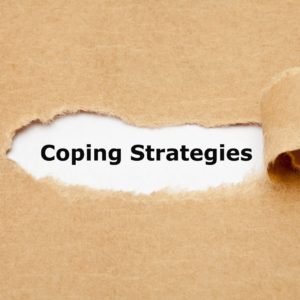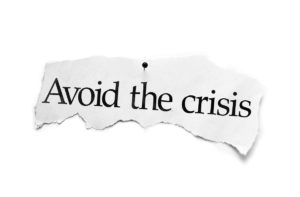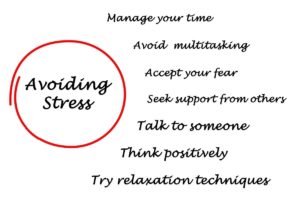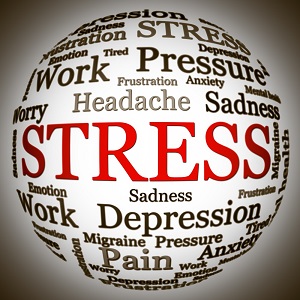 Avoidance. Why is it so hard to do the things we need to and, more importantly, want to do? The good news is that we can stop using avoidance as a way to cope with stress.
Avoidance. Why is it so hard to do the things we need to and, more importantly, want to do? The good news is that we can stop using avoidance as a way to cope with stress.
Sometimes it can seem like our biggest obstacle in the world is ourselves.
We are good at derailing ourselves, especially when we are feeling unsure, stressed out, or as though we are just not up to the task.
Our self-doubts and perceived inadequacies become our greatest challenge.
The next thing we know, we are avoiding living our lives or getting things done.
Why We Use Avoidance
When we find ourselves using avoidance as a way to cope instead of facing the issue, we become more stressed.
We are susceptible to avoiding challenges because we think that we are actually trying to take care of ourselves in a stressful situation.
Unfortunately, that is not the case. We just end up more anxious and stressed.
Methods to Stop Avoidance in its Tracks
 We all avoid things once in a while. It’s pretty normal, especially if we’re burned out, tired, or feel unsure about what we need to do next.
We all avoid things once in a while. It’s pretty normal, especially if we’re burned out, tired, or feel unsure about what we need to do next.
Sometimes though, it can be hard to get started again once you stop. Thankfully, some surefire techniques will stop avoidance in its tracks.
Start Small
The more you sit worrying about how big a project is, the less likely you will do it. The main thing is to focus on what the next step is.
What is the one thing you can be doing right now which will move you toward your goal? Once you have decided on this step, it’s just a matter of doing it.
Yes, this is easier said than done, especially if you’ve been putting this off for a while. Remember, you can always warm up to a task.
The nice thing? Once you get in motion, you are more likely to stay in motion. It’s just a matter of getting started.
Break it Up
 Many times we start because the problem seems too large. The next step is enormous.
Many times we start because the problem seems too large. The next step is enormous.
When this happens, take a few minutes to create a list of action steps to take you where you need to go.
Now, armed with this list, focus on the next task. Make the steps as small as you need to to feel like you have a handle on things.
There is nothing wrong with taking baby steps.
Take a Break
Sometimes, the opposite of the situation is true. If starting seems impossible because you are too tired, burned out, or need a break, it might be time to take a step back.
Allow yourself fifteen minutes to do something relaxing. Don’t get caught up in other work, though.
It would be better to take a walk, get some fresh air, or close your eyes and meditate for a little bit for the best results.
Remember the Dream
We are most productive when we understand what we’re doing and why we are doing it.
Anytime we are unsure, we are less likely to make progress.
What is the eventual goal? How does this action link with your goal?
Find a Reward
 Whenever you need to get through something distasteful, remind yourself how good it will feel to be done.
Whenever you need to get through something distasteful, remind yourself how good it will feel to be done.
If satisfaction isn’t enough, there’s a lot to be said for good old-fashioned bribery.
What’s a small treat you can give yourself for finishing this project?
Some Thoughts:
Using these methods, you should be able to stop avoidance in its tracks. No matter what, once you start, keep going.
Avoidance has a way of doubling back on you if you’re not careful. And that is no way to improve your life.
Things You Can Do When You’re Using Avoidance
Perhaps it has been one of those days. One thing after another has cropped up, each one more demanding than the last.
Between work, family responsibilities, and social obligation, you feel as though you’re slowly being crushed and having to do a mountain of tasks.
What do you do?
 If you’re like most people, you start avoiding things.
If you’re like most people, you start avoiding things.
The problem is, the more things pile up, the more overwhelmed you feel until soon you’ve shut down completely.
Now you are avoiding everything, and nothing is getting done.
How do you get out of this?
Know the Signs
Your body will tell you when you’re reaching the shutdown point.
This point is where your muscles seem tight, your head hurts, your stomach aches, and you start snapping at everyone around you.
The moment you notice these signs, it’s time to take a step back and reassess the situation before you head down the path to avoidance.
Quit Trying to Predict the Future
When we become overwhelmed, we start creating three negative outcomes in our minds.
Here’s where we assume every conversation is going to go wrong.
We expect every project to fail. It’s no wonder we shut down.
Again, here is where you need to step back and ask yourself what is the more realistic expectation?
It’s probably not going to be as bad as you think.
If you need to, remind yourself of similar disaster predictions you’ve made in the past, which never wound up happening.
Break it Down
 When overwhelmed, everything seems like too much work, so you start avoiding anything requiring action.
When overwhelmed, everything seems like too much work, so you start avoiding anything requiring action.
This is why you need to start tackling things in very small steps.
Small steps will always feel more doable than large ones.
It’s also easier to keep your focus in stressful times when you’re keeping your eyes firmly on only what’s in front of you.
Take Action
The more you worry about things you need to be doing, the bigger they will grow in your mind. Instead, don’t give yourself time to think.
Jump right in and get done what needs to be done.
Now it’s out of the way, and you don’t have to think about it anymore.
Own Up
Even if the pending disaster does manifest, it doesn’t have to be the end of the world.
Rather than avoid the outcome, face up to it.
It’s easier to apologize if you need to.
Embrace the lessons to be learned rather than running away forever, thinking you’re a failure.
The Psychology of Avoidance & Safety Behaviour in Anxiety Video:
It can be hard to remember all these things when you’re overwhelmed, so above all, remember this: Go easy on yourself.
If you do your best and keep moving forward, things will always work out in the end especially if you can stop using avoidance.






